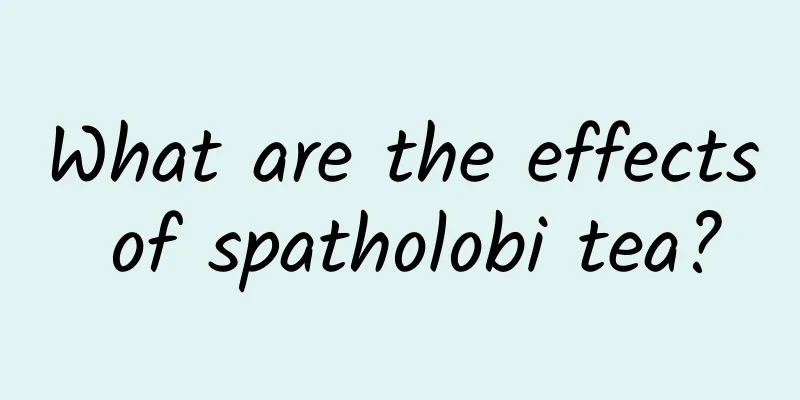The efficacy and function of tulips

|
There are so many medicinal herbs in the world, and it is inevitable that there are some that we are not familiar with. But as long as we have the spirit of learning throughout our lives, I believe we can slowly learn more medical herbs. So do you know about tulip as a medicinal herb? [Other names] Yuxiang (Taiping Yulan), red and blue flower, purple Shuxiang (Compendium of Materia Medica). [Source] It is the flower of tulip, a plant of the Liliaceae family. [Original form] Perennial herb. The bulb is oval, about 2 cm long, and covered with a light yellow fibrous membrane. The leaves are basal; 3 to 4 pieces, ribbon-lanceolate to ovate-lanceolate, 10 to 21 cm long and 1 to 6.5 cm wide. The scape is 35 to 55 cm long; the flowers are solitary, erect, 5 to 7.5 cm long; there are 6 petals, obovate, bright yellow or purple-red, with yellow stripes and spots: 6 stamens, free, anthers 0.7 to 1.3 cm long, attached at the base, filaments broad at the base; pistil 1.7 to 2.5 cm long, style 3-lobed to the base, recurved. Capsule, 3-loculed, dorsally dehiscent. Seeds numerous, flat. Flowering period is late April. 【Habitat distribution】 Native to Europe. It is cultivated in many gardens across my country. 【Chemical composition】 The flowers contain cyanidin, salicylic acid and arginine. The pistil, stem and leaves contain tuliposide A, tuliposide B and a small amount of tuliposide C with antibacterial effects. Tuliposide A and B can be partially converted into inactive 6-tuliposide A and 6-tuliposide B after being left alone. The buds contain gibberellin A1. [Pharmacological action] It has been reported that the flowers and leaves contain a toxic bioalkaloid whose physiological action is similar to that of ceftriaxone. Tuliposide A, B, and C have inhibitory effects on Bacillus subtilis. After passing through cation and anion exchange resins, tulip juice still has antibacterial effect on Staphylococcus aureus. The alcohol extract of the stems and leaves has antibacterial effect on Bacillus cereus mycoides, and its active ingredients contain various amino acids. 【Properties and flavors】 ① "Supplement to Compendium of Materia Medica": "bitter, flat, non-toxic." 【Functions and indications】 ① "Compendium of Materia Medica": "It can cure all kinds of odors, remove evil spirits and diseases in the heart and abdomen, and can be used in various aromatic medicines." 【Excerpt】 《*Dictionary》 [Source] From "Supplement to Compendium of Materia Medica". Although tulips have many magical effects, they cannot be eaten casually. We need to use the medicine according to the user's own situation. I hope everyone will not take it indiscriminately to avoid unnecessary consequences. |
<<: The efficacy and function of Yu Li root
>>: The efficacy and function of Yumin Fritillaria
Recommend
Spring rain is as precious as oil, but in some places people are worried when it rains?
"Spring rain is as precious as oil" is ...
How to take amber powder
Amber powder is a medicinal material with relativ...
What are the effects and functions of Angelica dahurica
Medicines are very common in our lives and are ve...
Are primary and secondary school students addicted to "nasal energy bars"? The more they inhale, the more addicted they become?
Recently, two primary school students in Tianjin ...
Can Luo Han Guo be taken for a long time?
Monk fruit is a traditional Chinese medicinal mat...
Traffic Analysis of the Top 5 Online Shopping Websites in the United States in August 2014
1. Ranking of U.S. Shopping Websites (Top 10) Cat...
The efficacy and function of Baile Tea
Many people choose catechu because of its high-va...
When buying movie tickets, don’t fight for the last row.
I want to ask everyone, when you go to the cinema...
The efficacy and function of paddy field seven leaves
Aesculus fragrans has a long history, and up to n...
State Post Bureau: From January to February 2023, the postal industry's delivery business volume totaled 21.0 billion pieces, a year-on-year increase of 3.0%
Recently, the State Post Bureau announced the ope...
How to heat the lavender bear?
Lavender is a very common plant, especially in Fr...
Is laser necessarily hot? When it is cooled, it is super cool
Author: Li Wei (Institute of Plasma Physics, Hefe...
When the Siberian Tiger is called "Big Hakimi"...
Erbin has become really popular recently! The hos...
What are travel enthusiasts quietly doing for sustainable development?
Booking.com's latest Sustainable Travel Repor...









